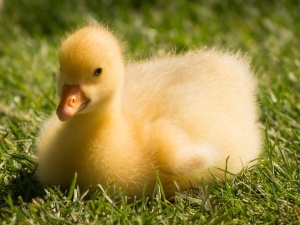
Everyone wants to hatch happy and healthy ducklings, but unfortunately, newly hatched ducklings can hatch with complications.
Newly hatched ducklings can also develop complications soon after hatching. This article explores this topic.
Table of Contents
Newly hatched duckling problems
If you’re lucky you’ll hatch a healthy brood of ducklings, but sometimes, some ducklings will hatch with complications or will develop complications in their first few days of life, here are some conditions that you should look out for:
Unabsorbed yolk:
Premature ducklings usually hatch with an unabsorbed yolk. These birds are meant to absorb the remainder of their yolks a few days before they hatch.
If the bird hatched too early then it may not have had the opportunity to absorb the yolk and will hatch with the yolk outside of its body.
What to do:
The bird may still absorb the yolk, even after hatching, as long as the bird is kept in the right conditions. The bird would need to be kept in an isolated space, and the yolk would need to be kept moist for reabsorption to happen.
If the yolk is not kept moist then it will dry up and the bird won’t be able to absorb it.
Keeping the bird isolated will keep other ducklings away from the bird and will keep curious ducklings from pecking at the exposed yolk.
Ducklings can also be very dirty, if your premature bird is exposed to the other ducklings then it may develop a life-threatening infection.
If your bird doesn’t absorb its yolk then feeding the bird sugar water will give it a boost of energy. You’d also need to feed the bird food on the day that it hatches, not 24 hours after it hatches.
Feed the bird ground-up waterfowl starter crumbs or unmedicated chick crumbs, mix these feeds with some room temperature water to make it easier for the bird to eat and digest.
Becoming too cold:
Temperature fluctuations can affect your birds in a big way. If your ducklings are exposed to too cold temperatures then they can become too cold very quickly.
The duckling can get too cold after being exposed to very cold temperatures or after coming in contact with water and not being dried off. This can cause the bird’s body temperature to drop and can kill the bird.
Young ducklings aren’t yet able to produce the oil that waterproofs their wings, because of this they can quickly get too cold.
What to do:
You’d need to dry the bird off after it swims and put it back in the brooder to keep it from getting too cold.
Make sure that your bird’s brooder is kept at the correct temperature for it, the brooder temperature needs to be set at around 90-95 degrees Fahrenheit for the first week of life.
Decrease the temperature by 5 degrees weekly for the next 3 weeks.
If you’ve made a home brooder you can use a 60 to 75-watt light bulb as a heat source
Dirty nares and eyes:
Ducklings need access to clean and fresh water at all times. They need water to drink and dunk their head in, but they also need to be kept dry, this can be a bit of a headache to manage.
If they don’t have somewhere to dip their heads in then their eyes and nares can become dirty.
What to do:
You can get around this dilemma by creating a waterer that is high enough for the birds to drink out of and dunk their whole heads in, but won’t get their body wet. Dunking their heads allows the birds to clean their nares and eyes out.
You can make a DIY waterer using a clean milk jug. Mark off the level where a duckling can easily reach in and fit its head, then cut out rectangles big enough for the bird’s head.
Pour water into the jug and stop at the bottom of the rectangle. Tape the edges of the rectangle to keep the edges from scratching the bird’s head when the waterer is in use. Create new waterers once the bird outgrows the old ones.
These birds need new waterers on a regular basis because they grow so fast.
Incorrect feeding
A common problem that can show up in ducklings is the onset of a disease, sickness, ailment, or condition because of an incorrect diet.
What to do:
Incorrect feed can greatly, and negatively, affect your baby bird’s health. Thus, giving them foods that are nutritionally dense and appropriate for ducks is key.
Make sure that your bird is eating the correct feed namely unmedicated chick crumble (18%) for the first few weeks of life.
Thereafter feed the bird a 16% crumble until they are about 4-4,5 months old (near the egg laying stage). Once the birds reach the egg laying stage they can be fed regular feed
Avoid giving these birds medicated chick feed, ducklings eat more than chicks do, they will overeat the medicated feed and it will negatively affect their health.
FAQ:
What does a sick duckling look like?
Signs of sickness in your duckling include lethargy, a lack of appetite, diarrhea, changes in breathing, sinus flaring, panting, mucous discharge, discharge from the eyes and nose, increased thirst, a change in droppings, a loss is coordination, a general look of being unwell.
How do you know if a duckling is in distress?
If the bird is in distress it will be lethargic and have a lack of appetite.
You may want to take your pet to the vet if these are the signs you’re seeing in your bird
If you enjoyed this article then you may also be interested in other duck related articles. Here are some articles that you may be interested in: Duck Eggs Not Pipping, Weak Duckling, Lethargic Duckling, Duckling Hatched With Unabsorbed Yolk

